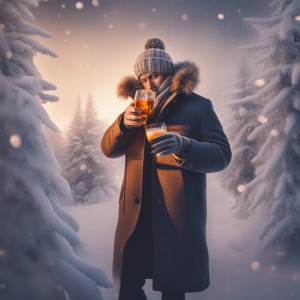Uncover the Hidden Dangers of Consuming Alcohol in Freezing Weather
As we face the unforgiving challenges of winter, especially in severely cold regions, our natural inclination is often to seek solace in alcohol to feel warmer. However, it is crucial to recognize the significant dangers tied to this choice. This article will illuminate the risks associated with drinking alcohol in icy conditions, highlighting why this practice is not only perilous but also ineffective for maintaining body warmth. By increasing your understanding of these hazards, you can make informed choices that prioritize your safety and well-being during the treacherous winter months.
Before exploring the associated dangers, it is important to address the widespread myth that alcohol can effectively warm the body. Upon drinking, alcohol triggers the dilation of blood vessels near the skin’s surface, which can create a deceptive sensation of warmth. Although this feeling might provide temporary comfort, it fails to meet the vital need for sustaining a consistent internal body temperature. In reality, the consequences of alcohol consumption can be detrimental, potentially reducing your resilience against cold weather and elevating the risk of severe conditions such as hypothermia and other life-threatening health issues.
 One major danger associated with alcohol consumption in frigid environments is the heightened risk of dehydration. Alcohol acts as a diuretic, promoting increased urine production, which results in significant fluid loss. Moreover, the cold air prevalent in winter is typically drier, causing our bodies to lose moisture at an accelerated rate. When these factors are combined, the outcome can be dangerously low hydration levels, which are essential for sustaining overall health and survival. Dehydration can adversely affect not only physical performance but also cognitive capabilities, leading to difficulties in clear thinking and rational decision-making in critical scenarios.
One major danger associated with alcohol consumption in frigid environments is the heightened risk of dehydration. Alcohol acts as a diuretic, promoting increased urine production, which results in significant fluid loss. Moreover, the cold air prevalent in winter is typically drier, causing our bodies to lose moisture at an accelerated rate. When these factors are combined, the outcome can be dangerously low hydration levels, which are essential for sustaining overall health and survival. Dehydration can adversely affect not only physical performance but also cognitive capabilities, leading to difficulties in clear thinking and rational decision-making in critical scenarios.
Recognizing How Alcohol Affects Judgment and Awareness in Cold Conditions
A vital consequence of consuming alcohol is its detrimental effect on cognitive function and decision-making abilities. In survival situations, the ability to make clear and rational decisions is paramount for ensuring safety. Alcohol can cloud judgment, making it increasingly challenging to react appropriately to dangers. This impairment in reasoning can lead to accidents and poor choices, which can have particularly disastrous consequences when confronted with extreme cold. Staying alert and aware of one’s surroundings is crucial; however, alcohol undermines this necessity, increasing the likelihood of errors that could jeopardize personal safety.
Furthermore, alcohol can severely disrupt the body’s natural mechanisms for temperature regulation. When consumed, alcohol causes blood vessels in the skin to dilate, leading to enhanced heat loss. Initially, this may produce a fleeting sense of warmth, but over time, it accelerates the loss of core body heat, which is vital for survival. This creates a perilous cycle where the temporary warmth leads to a swift drop in core temperature, thereby elevating the risk of life-threatening complications such as hypothermia. It is crucial to understand that while alcohol may seem like a quick solution to cold, it ultimately increases vulnerability to the harsh elements.
Understanding the Dangerous Link Between Hypothermia and Alcohol Consumption
When discussing the threat of hypothermia, it is essential to comprehend how alcohol consumption can obscure the early warning signs of this perilous condition. Hypothermia occurs when the body’s core temperature falls below the normal range, usually below 95 degrees Fahrenheit (35 degrees Celsius). Symptoms can include shivering, confusion, fatigue, and reduced coordination. However, alcohol suppresses our body’s natural responses, making it increasingly difficult to identify these critical indicators. By the time hypothermia symptoms become apparent, it may be too late to avert severe injury or life-threatening repercussions.
In winter survival scenarios, there are numerous safer and more effective alternatives to alcohol for preserving body warmth. Here are some practical strategies that can significantly enhance your ability to stay warm and safe:
1. Layer Your Clothing to Maximize Warmth: Wearing multiple layers of clothing is essential for effectively trapping warm air. Begin with thermal base layers, add insulating mid-layers, and finish with a windproof and waterproof outer layer to create a protective barrier against the cold.
2. Ensure Your Clothing and Footwear Stay Dry: Moisture can lead to rapid heat loss, so it’s imperative to keep your clothing and footwear dry at all times. Opting for waterproof materials and changing into dry garments whenever necessary will help preserve warmth.
3. Insulate Yourself from Cold Surfaces: Utilizing sleeping mats or insulation pads can greatly reduce heat loss, particularly during sleep. This measure is crucial for conserving body heat during prolonged exposure to cold environments.
4. Choose Warm, Non-Alcoholic Beverages: Instead of turning to alcohol, consider enjoying hot beverages like tea, coffee, or hot chocolate. These drinks provide warmth without the adverse effects linked to alcohol consumption.
5. Seek or Construct Shelter for Protection: Actively finding or building a shelter can significantly minimize exposure to harsh winds and freezing temperatures. A well-constructed shelter is vital for retaining body heat, greatly improving your chances of staying warm.
6. Fuel Your Body with High-Calorie Foods: Consuming nutrient-dense foods that are high in calories can provide your body with the necessary energy to generate heat. Foods such as nuts and fatty fish are excellent sources of healthy fats that can be particularly beneficial.
Understanding the hazards of alcohol consumption in freezing temperatures is essential for anyone involved in winter survival situations. Despite the temporary feeling of warmth it may provide, alcohol can lead to dehydration, impaired judgment, hindered temperature regulation, and mask the symptoms of hypothermia. By avoiding alcohol and implementing safe, effective strategies, we can enhance our chances of surviving and thriving in harsh winter environments. Stay alert, prepare thoroughly, and prioritize your safety above all else.
The post Hazards of Alcohol Consumption in Extreme Cold Conditions appeared first on Survival Bite.
The Article Alcohol Consumption Hazards in Extreme Cold Conditions Was Found On https://limitsofstrategy.com


6 Responses
This is such an important topic to bring attention to, especially as we navigate the harshness of winter. I’ve certainly experienced that fleeting warmth felt after a drink in the cold, and like many, I assumed it offered some sort of real benefit. Your point about alcohol causing blood vessels to dilate and leading to a false sense of warmth is particularly eye-opening.
It’s interesting how our experiences shape our understanding of things like warmth and comfort during winter. I’ve definitely felt that brief warmth you mentioned after a drink in the cold, and it’s easy to see why many of us might cling to that sensation as something beneficial. The science behind it can catch us off guard—it’s kind of deceptive how our bodies react.
This is a crucial topic, especially as so many people turn to alcohol for comfort during the harsh winter months. I’ve often found that the myth of alcohol as a source of warmth is deeply ingrained in many cultures. It’s interesting to consider that while alcohol can create that initial sensation of warmth, it ultimately leads to increased heat loss and can be dangerously misleading.
I appreciate how your article sheds light on the often-overlooked dangers of consuming alcohol in frigid temperatures. It’s a common misconception that alcohol can provide warmth, and your point about the dilation of blood vessels is particularly enlightening. This physiological reaction can indeed trick individuals into feeling more comfortable in cold environments, but as you rightly point out, the reality is much more perilous.
This is such an eye-opener! I always thought a hot toddy was the ultimate winter survival strategy. Turns out, it’s more like playing with fire—literally. I mean, who knew that feeling warm and actually being warm were two completely different things? It’s a bit like giving your taste buds a cozy blanket while your body stands out in the snow, freezing its backside off!
This is such an important topic, especially as winter sets in and we’re all looking for ways to stay warm. I’ve definitely fallen into the trap of thinking that a hot drink with a splash of whiskey or rum would help against the chill. It’s a tricky mindset, though, because that initial warmth can be misleading. In fact, I’ve read that the additional alcohol consumption in the cold can sometimes lead to poor decision-making, like venturing out when it might not be safe.